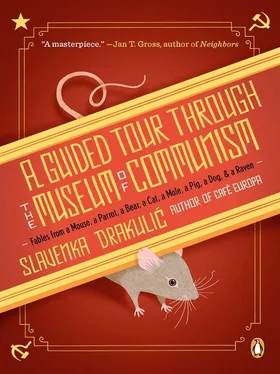Well, what can I tell you? There was no intention to “exterminate” the dogs in the first place. Afterward, that lady’s money went to a few shelters, a few sterilizations—you can recognize these dogs by yellow tags they wear on one ear—and that was that. Most of it just disappeared, as usual.
Listen, I have a nice detail for your dog story. In the spring of 2008, city authorities cleared all the stray dogs out of the way so that foreign politicians coming to the NATO summit could pass undisturbed from the airports to the House of the People, where the summit was held. All the existing shelters were apparently filled with these dogs. You see, typically, our authorities only act when pressured from outside.
“It’s one of these bittersweet tales,” you remark. Bitter, yes, but not sweet. I remember times when Ceausescu’s police would clear all “suspicious elements” of your own species from the streets; now they are down to clearing away dogs. Strange, very strange.
No doubt, this represents progress. This is the twenty-first century; we are in the European Union. Except that all Romanians ever cared about was appearance, not a solution! I’d say that Romania hasn’t changed much in that respect. The “dog problem” hasn’t been solved, if stray dogs ever really were a problem for the people of Bucharest, which nowadays I doubt more and more. You rightly observe that not much was done about dogs except when foreigners got involved. This, however, brings us to the beginning of this conversation. You’ve listened patiently to such a long monologue from an old fool and received no real explanation. But if you look around, what else can you see besides stray dogs and clogged traffic? You see, again, old, beautiful (even if decrepit) villas being demolished to make room for new buildings of steel and glass—for foreign banks and corporations, like in Shanghai or Singapore. For new masters, who no longer rule by fear but by greed.
In the transition from Communism to capitalism, all people are unequal, but some are more unequal than others.
Stray dogs don’t fit into that new capitalist Bucharest, and mayor after mayor promises to do something about them. But he never acts. Probably there are many reasons for not acting and, moreover, for not knowing how to act. One could certainly blame it on cowboy capitalism, corrupt bureaucracies, bad politics, or disappointment with the EU. But I happen to believe that in Romania dogs are considered as much the victims both of Communism and the democratization process (or the transition period, as they call it) as your own kind. I observe that when an individual in this society feels pretty lost and helpless, he doesn’t know how to take responsibility for his own life, much less for that of the poor dogs in his neighborhood. It doesn’t help that democracy, so far, means only that those who are up stay up, like in a kind of a merry-go-round of power. It also could be a laissez-faire attitude of this society in general, which hasn’t woken up properly from the Communist slumber. Generally speaking, people still believe that there will be always someone “up there” to make a decision in their names—whom they can blame later on. If yesterday it was Communism, today it is the bureaucracy in Brussels. Leaving everything to the higher-ups, not taking the initiative, not willingly acting in the common interest—this, in my modest dog’s opinion, is really what our problem is. What do you do when there’s not even an idea of a common interest, a common good ? In a society like ours it needs to be created. The lack of it means that one day we’ll wake up to a decision of someone high up that dogs finally have to go. In the name of the EU we’ll be swept away for good. Then there will be a short outrage; the party in charge will perhaps lose a few votes. So what?, one may think. But, permit me to say these harsh words: The question is, Who will be next? Gypsies, perhaps? Jews? And why not people with glasses?
Sorry, sorry. As I said, I tend to get carried away. Look at me, an old dog giving speeches! As you can see, in Romania even dogs are political animals.
You could almost take this whole canine story as a metaphor for humans in Romania: victimized, abandoned, poor, hungry for everything, totally disillusioned. But this would be a bad metaphor, because, unlike humans, dogs won’t get together and vote for someone like Napoleon (I’m referring to Animal Farm , George Orwell’s ingenious parable) or go and start a war. And here I would like to leave you, my friend, to ponder over the frustrations that lead to populism—and to wait and see what these newly declassed masses will come up with, who will manipulate them and how.
But before we part, let me tell you just one more story. Have you heard of the “Baghdad Pups”? No? Of course not, this is a typical American venture. It’s about stray dogs in Afghanistan and in Iraq and about American soldiers who befriended them. Boys wanted to take their friends back with them to the United States, but it proved to be against the law. However, a certain navy lieutenant was so in love with his dog, Cinnamon (what an idiotic name for a dog, I must say!), that he managed to do the impossible. He gave Cinnamon to a contractor, who took him to Bishkek in Kyrgyzstan. But the man could not put the dog on a civilian flight to the United States, so he abandoned Cinnamon at the airport. An airline employee gave the pup to a local family. Then the lieutenant’s energetic sister stepped in and, with the help of some organization or other, located the lost dog. Now Cinnamon lives happily ever after in Maryland. Americans being Americans, they immediately realized that there are more soldiers who would like to do the same, so they organized “Operation Baghdad Pups.” Their newspapers report that so far more than thirty pet formerly stray dogs have been brought over—don’t ask how! The point is that Americans do things by themselves. They don’t wait and despair.
Now, what shocked me are the costs of such rescue trips, between four thousand and six thousand dollars per dog. This gave me an idea. True, unfortunately Romania is not occupied by American soldiers. But why shouldn’t we take action ourselves and, under the slogan “Exportation, not extermination” (I imagine this could catch media attention), offer our dogs for adoption abroad? I’m sure that there are people willing to take them; costs would be one third of the American costs, if not less. Remember how Westerners were crazy about adopting our children from orphanages? Not that dogs are as popular as white orphans, but one could at least try. For example, what if adoption included a free long weekend in Bucharest with your future pet? Of course, someone is bound to label this “dog tourism,” but I think it is better and more decent than, for example, sex tourism. The more I think about the idea, the more I like it. But being an old and experienced dog, I suspect that Romanians would rather do real business by selling dogs to the Koreans as meat! In fact, I’m surprised that no one has already had that idea. The state would probably subsidize it, and some smart-ass with good connections would get rich over our dead bodies. And then he’d launch himself head-on into politics, including in his program the defense of animal rights! None of that would surprise me—especially because I heard rumors that something similar happened in the Chinatown of Budapest. But what’s that you say? I see your face; you’re smiling and shrugging your shoulders. You must think I’m mad.
Hey, relax. After all, I’m only a dog!
VIII
THE UNUSUAL CASE OF THE PSYCHOTIC RAVEN
Look, I have here a notebook from my mother. She died last week, and I came to Tirana to attend her funeral. I found it among a few possessions my mother took to the hospital with her. I am now bringing her notebook to you because you are my old friend and publisher. I would like you to tell me what to do with it, if anything. Is it perhaps worthwhile publishing it—maybe not in this form, but as a contribution to a book about Communism in Albania? No, no, let me try again: What I want to say is that her notes should be published if you were to find them interesting. I don’t know if this is the time to do it either—you know better than I what it means. I have been living in America for such a long time, fifteen years now, that I don’t really know how things work in Albania any longer. I only remember that, when I studied here in the nineties, I often heard “it’s not the time yet” for mentioning or publishing this or that. So, who am I to say?
Читать дальше












